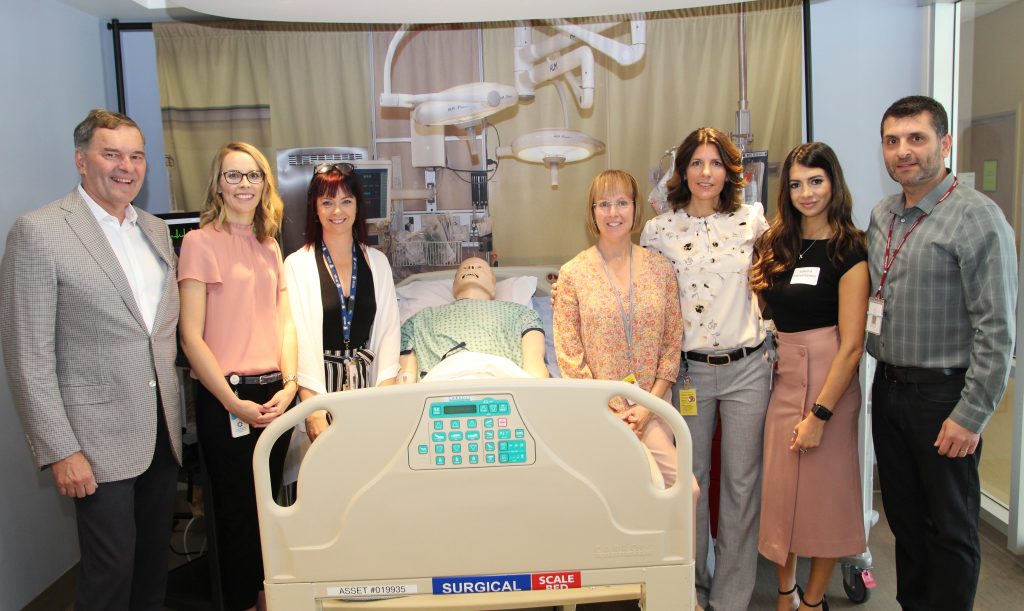Hospital Celebrates Improved Education with Grand Opening of New Ibn Sina Simulation Lab
by Maryanne Matthews
 Dr. Stewart Kennedy and Thunder Bay Regional Health Sciences Centre's Interprofessional Education team helped champion the development of the Ibn Sina Simulation Lab that will provide improved medical education. From left to right: Dr. Stewart Kennedy, Kendra Walt, Leanne Baird, Tracey Hill, Kelly Meservia-Collins, Valena Provenzano and Bruno Tassone.
Dr. Stewart Kennedy and Thunder Bay Regional Health Sciences Centre's Interprofessional Education team helped champion the development of the Ibn Sina Simulation Lab that will provide improved medical education. From left to right: Dr. Stewart Kennedy, Kendra Walt, Leanne Baird, Tracey Hill, Kelly Meservia-Collins, Valena Provenzano and Bruno Tassone.Thunder Bay Regional Health Sciences Centre now provides improved medical education. The Grand Opening of the new Ibn Sina Simulation Lab, located in the Hospital, highlighted the advantages of simulation and celebrated the donors who made it possible.
“As an academic health sciences centre, we are committed to teaching the next generation of health care professionals,” said Jean Bartkowiak, Hospital President & CEO and CEO of Thunder Bay Regional Health Research Institute. “In our Strategic Plan 2020, we set out to develop models and structures that would best enable teaching and research for physicians and health professionals, as well as to implement best practices in the delivery of education and knowledge transfer. This new Simulation Lab is a valuable addition to our Hospital’s teaching implements.”
Simulation education allows health care practitioners to safely acquire the skills and experience they need, in a variety of clinical settings. It is the best practice for training, and aligns our Hospital with other academic health science centres across Ontario and Canada.
“One of the unique benefits of simulation is that it can replicate a multitude of rare, complex, or high-stakes scenarios known to affect individual and team performance, without risking patient safety. While all physicians eventually perform procedures on and manage critical events for an actual patient for the first time, simulation makes those initial interactions with patients more familiar,” said Dr. Stewart Kennedy, Executive Vice President of Regional Programs, Clinical Supports & Medical Affairs. “A high quality simulation training centre, right here in our Hospital, will have a meaningful impact on current and future learners – who will then pass those benefits on to our patients and their families through safe, quality patient care.”
Dr. Alyson Dykstra, an Internal Medicine physician at our Hospital, knows first-hand how valuable simulation training is to future and current health care providers. “Simulation training really helps foster not only competence, but confidence in our ability to manage complex patient interactions,” she said. “I feel fortunate to work at a Hospital that prioritizes ongoing education that supports physicians like me to continue to provide the best care possible to our patients.”
The Ibn Sina Simulation Lab is named after a Muslim Physician, Astronomist and Philosopher, who was a father of early modern medicine and was funded by a group of Muslim Physicians who generously donated $500,000 to project.
“Seeking knowledge is deeply rooted in each Muslim. Disseminating knowledge, using it to improve the general good, and leading others by example all resonates deeply with the Muslim mindset, and is also mirrored in the Hospital’s own vision,” said Dr. Zaki Ahmed, Hospital Chief of Staff and member of the Muslim Physician Group. “That shared commitment along with our sincere hope to give back to our profession, institution, and community at large, is what motivated each and every one of us to be a part of such a great project.”
“A donation of this magnitude is transformational in the impact it has, not only today, but well into the future,” said Glenn Craig, President and CEO of Thunder Bay Regional Health Sciences Foundation. “Thanks to the Muslim Physicians, learners at the Hospital will enhance their skills through simulation, which will ultimately benefit our families and friends when they are cared for as patients. Together, we are bringing better health care to Northwestern Ontario and our physicians are true leaders in making this possible.”
All Hospital staff and learners Hospital and our academic partners (Lakehead University, Northern Ontario School of Medicine and the Confederation College) will be able to expand their skills and knowledge in the new Ibn Sina Simulation Lab. To learn more about Thunder Bay Regional Health Sciences Centre’s commitment to learning, visit www.tbrhsc/net/education